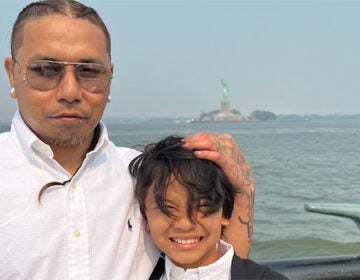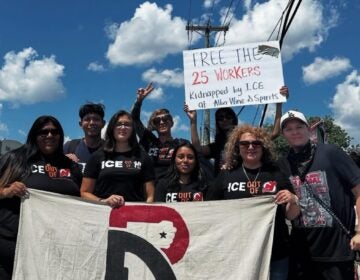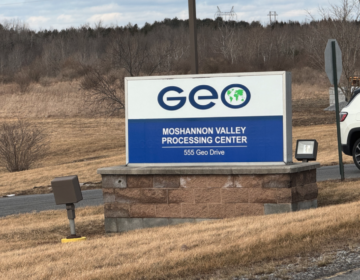Philly protest, dozens more blast Trump for splitting up families at Mexican border
The Center City protesters were among thousands of immigrant advocates in more than 30 cities who took to the streets to assail the policy.
-
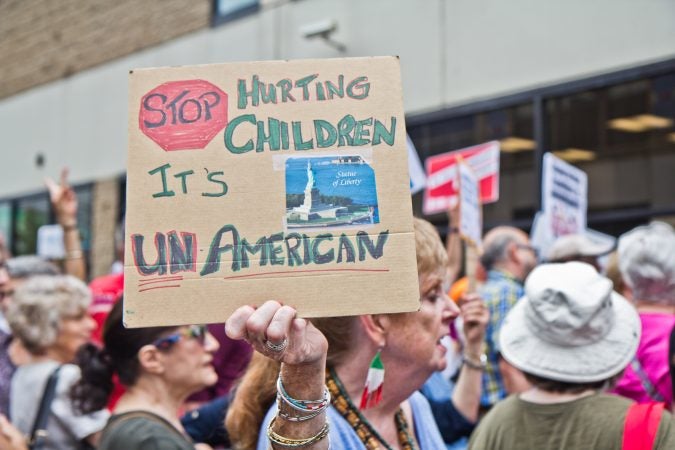
Abbie Hyde protests the practice of separating children from their families outside of the Center City offices of ICE in Philadelphia. (Kimberly Paynter/WHYY)
-
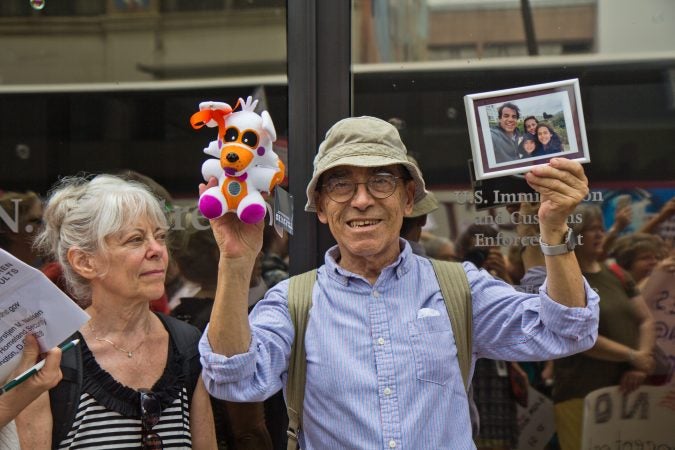
Ramon Garcia Castro holds up a photo of his family in Chile outside of the Center City offices of ICE to protest the practice of separating children from their families. (Kimberly Paynter/WHYY)
-
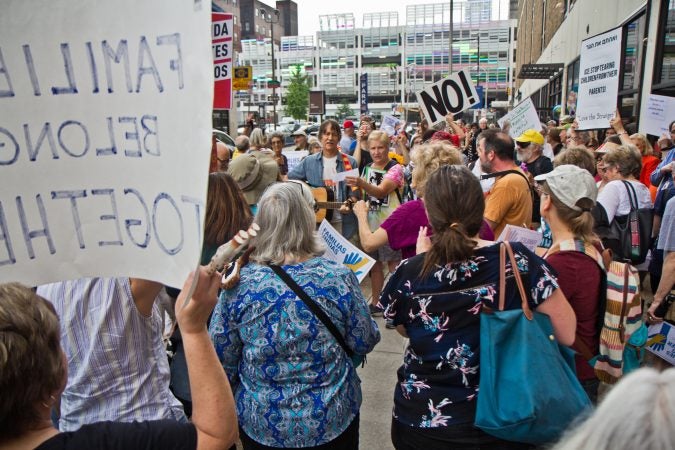
The ACLU and human rights groups rallied outside of the Center City offices of ICE in Philadelphia to protest the practice of separating children from their families. (Kimberly Paynter/WHYY)
-
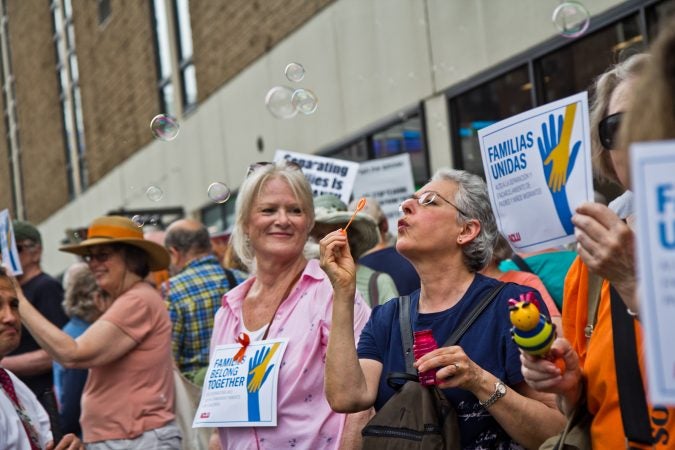
Amy Trachtenberg blows bubbles outside of the Center City Philadelphia office of ICE to protest the practice of separating children from their families. (Kimberly Paynter/WHYY)
-
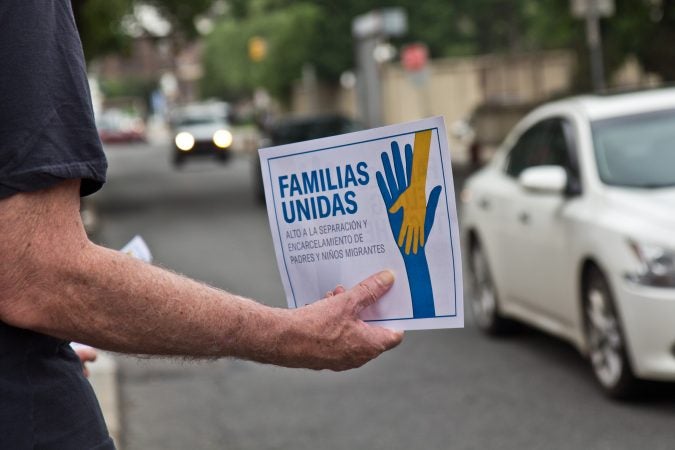
The ACLU and human rights groups rallied outside of the Center City offices of ICE in Philadelphia to protest the practice of separating children from their families. (Kimberly Paynter/WHYY)
-
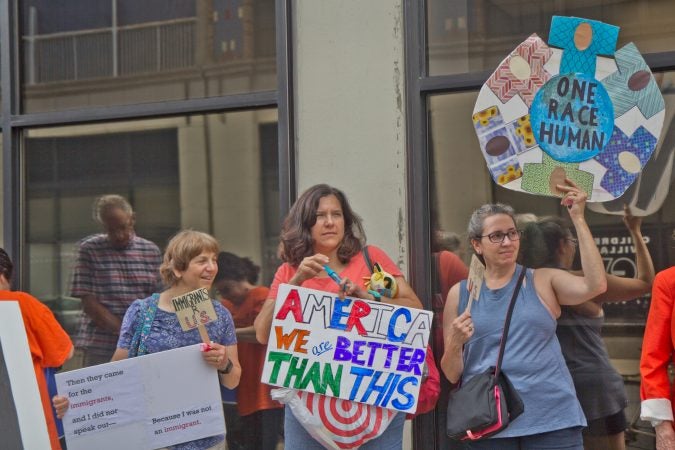
The ACLU and human rights groups rallied outside of the Center City offices of ICE in Philadelphia to protest the practice of separating children from their families. (Kimberly Paynter/WHYY)
More than a hundred people gathered at the Immigration and Customs Enforcement Philadelphia field office Friday to oppose a Trump administration policy that families caught trying to enter the country illegally be detained separately as the prosecution of their cases proceeds.
During the “National Day of Action,” some demonstrators blew bubbles and others stacked toys in front of the ICE office door to signify the young children who have been taken from their parents at U.S. border with Mexico.
The Center City protesters were among thousands of immigrant advocates in more than 30 cities who took to the streets to assail the policy.
Organizers called the ramped-up prosecution of those crossing the border “inhumane.”
The policy shift, announced in May, breaks with the longstanding tradition of keeping families together as their cases proceed, said Golnaz Fakhimi, immigration rights attorney with the ACLU of Pennsylvania.
“There is considerable psychological harm that’s being done — particularly to the young children who are being separated— and unimaginable psychological harm to their parents,” Fakhimi said.
The Trump administration launched the new policy to discourage illegal border crossings, a concept that many at Friday’s rally questioned.
“I don’t think it’s going to deter anyone,” said Terry Paula Hoffman, a retired chemist from Eagleville, Pennsylvania. “Because the people who are coming are not coming because they want to become rich. They’re coming here because their lives are at stake.”
Fakhimi concurred. “I think once people become more clear on the kinds of dangers and circumstances that drive migration, the idea behind this deterrence rationale will fall apart,” she said.
Immigration lawyers at the rally said family separations have created serious stress for parents and children now in separate detention centers, often thousands of miles apart.
“These family separations are exacting an incredible emotional toll on the parents and the children. There’s no telling what kind of psychological damage that kind of forced separation does for a kid,” said Elizabeth Yeager, an immigration lawyer with HIAS Pennsylvania.
Not only is the policy emotionally damaging, said Yeager, but separating families can also complicate pending legal proceedings.
“You are separating these children, often from the one person who is the key witness in the case,” she said. “And they are not able to go forward with their own asylum claim if they’re thousands of miles away from their parent and not able to communicate with them.”
Emma Boorboor, a Philadelphia-based deputy organizing director with UltraViolet, one of the groups that helped plan the nationwide rallies, said the demonstrations were aimed at applying pressure on federal lawmakers to respond quickly to the administration’s policy shifts.
“We’re out here to call on Congress to pass legislation to stop the forced separation of children from their families,” Boorboor said. “This is also something, obviously, that the Trump administration and the Department of Homeland Security can stop. They can reverse this any time. But we are calling on Congress to codify that.”
Sessions has vowed to prosecute everyone who crosses the southern border illegally, even those seeking asylum. Though some migrants may be escaping gang violence and other dangerous situations, Session said, the U.S. “cannot take everyone on this planet who is in a difficult situation.”
Yeager, the immigration lawyer, said the Trump administration’s hardline tactics differ sharply with the Obama administration’s approach, which was to focus on violent criminals and individuals who pose threats to national security.
But on the border, and in Philadelphia, everyone who is apprehended without legal status is being prosecuted.
“In the past, the government wasn’t necessarily prosecuting those people. Of course, all of those people end up getting detained by immigration and put in deportation proceedings. But what’s happening now is that, even before that, the government is putting criminal charges against people,” Yeager said. “And in doing so, they are separating children from their parents.”
WHYY is your source for fact-based, in-depth journalism and information. As a nonprofit organization, we rely on financial support from readers like you. Please give today.


